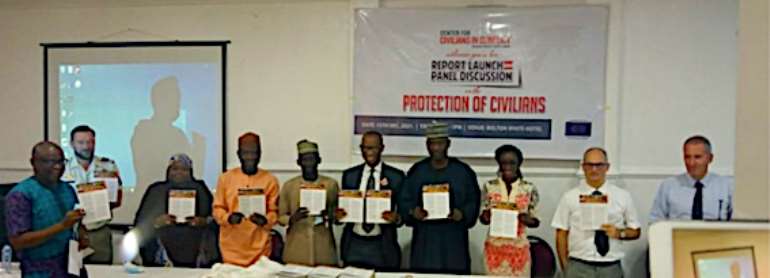CIVIC Hails Military for Strategic Step in Fighting Insecurity in Nigeria

The Center for Civilians in Conflict (CIVIC) has commended the Nigerian military for strategically curbing the scourge of insecurity in the North East of the country.
The international organization dedicated to the protection of civilians in conflict made this known on Wednesday in Abuja, during its public presentation of the 'Report Launch and Panel Discussion on the Protection of Civilians. It was on the protection briefing of the evolving protection challenges faced by citizens in Gwoza of Borno state.
The CIVIC, supported by the German Government, European Union, Foreign CommonWealth and Development Office, to assist civilians caught in the Northeast conflict, operates in 7 local governments in Borno state.
According to the Country Director, CIVIC, Dr Benson Olugbuo, the security situation has improved each year since the Nigerian military recaptured the town in 2015, as attacks on Gwoza town have shifted from being a regular occurrence to being sporadic in 2020, with further improvements noted in 2021.
Olugbuo disclosed that many civilians have been killed and abducted while engaging in farming and other livelihood activities that require them to travel outside of the town. In response, he said, the military started providing escorts to civilians, which provides an extra layer of protection for civilians as they engage in livelihood activities.
The CIVIC boss noted that the Nigerian military in 2019, adopted a ‘super camp’ strategy that consolidated smaller and more remote forward operating bases into larger and more fortified super camps. Some civilians in Gwoza town attributed the improved security situation in recent years to the super camp strategy, but civilians outside of Gwoza town continue to suffer protection threats.
Olugbuo however, noted that despite improvements in some aspects of the military’s behaviour towards civilians in Gwoza town, stakeholders reported sexual exploitation and abuse (SEA) of women and girls by the Nigerian military. After civilians and INGOs reported cases of SEA to the military, the military took action to reduce the rates of SEA, but SEA reportedly remains a problem.
The Country Director also disclosed that civilians expressed mixed feelings regarding a push for IDPs to return home, stating that some welcomed the opportunity to return to their former areas, while others felt relocating would make them more vulnerable.
He said: "Aside from the mixed feeling of returning home from IDP camps, civilians also had mixed feelings about the reintegration of former AOG combatants into the community. Some suggest that they are living in peace with ex-combatants because their consent was sought before reintegration, while others refuse to forgive them because of their alleged atrocities.
"The security situation in Gwoza town continues to improve each year, which is a step in the right direction for the protection of civilians. But more can still be done to ensure the safety of civilians in the region."
Olugbuo however, noted that the Nigerian military should revise their current strategy to not only offer protection in super camps but also to extend protection to civilians beyond garrison towns. He said that channels of communication between civilians and the military must remain open so civilians can report protection concerns, including SEA, and the military can quickly investigate and respond to these concerns.
"To better support the return of IDPs, Nigerian federal and state civilian agencies should ensure the security situation in Borno state is conducive for safe returns and adopt a do no harm approach by ensuring that returns are voluntary. They should additionally encourage the use of traditional platforms to support and manage the increasing rate of surrendering combatants and their families who will require reintegration into communities," he stated.
